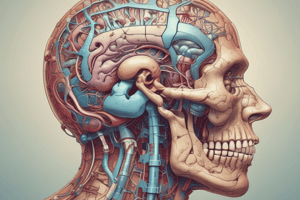Podcast
Questions and Answers
The _______ tracts are part of the ascending pathways for the body.
The _______ tracts are part of the ascending pathways for the body.
spinocerebellar
The dorsal column-medial lemniscus pathway is responsible for _______ touch.
The dorsal column-medial lemniscus pathway is responsible for _______ touch.
discriminative
_______ proprioception involves the ability to consciously sense joint position and movement.
_______ proprioception involves the ability to consciously sense joint position and movement.
Conscious
_______ endings are mechanoreceptors of the skin involved in discriminative touch.
_______ endings are mechanoreceptors of the skin involved in discriminative touch.
_______ is the ability to detect vibration and utilizes the same peripheral receptors as discriminative touch.
_______ is the ability to detect vibration and utilizes the same peripheral receptors as discriminative touch.
First order neurons have pseudounipolar neuron cell bodies located in the ______ root ganglia.
First order neurons have pseudounipolar neuron cell bodies located in the ______ root ganglia.
The dorsal columns are somatotopically organized from the midline to ______.
The dorsal columns are somatotopically organized from the midline to ______.
Lesions in the medial lemniscus pathway can result in the loss of touch and pressure sensation in the ______ extremity.
Lesions in the medial lemniscus pathway can result in the loss of touch and pressure sensation in the ______ extremity.
Second order neurons located in the nucleus gracilis and nucleus cuneatus decussate as ______ arcuate fibers.
Second order neurons located in the nucleus gracilis and nucleus cuneatus decussate as ______ arcuate fibers.
Third order neurons are located in the ventral posterolateral nucleus (VPL) of the ______.
Third order neurons are located in the ventral posterolateral nucleus (VPL) of the ______.
Study Notes
Ascending Pathways for the Body
- Spinocerebellar tracts: posterior (dorsal) spinocerebellar tracts, cuneocerebellar tracts, and anterior (ventral) spinocerebellar tracts
- Dorsal column-medial lemniscus pathway
- Anterolateral system: spinothalamic tracts, spinoreticular tracts, and spinomesencephalic tracts
Ascending Pathways for the Head and Neck
- Trigeminal system
General Aspects
- Pathway: route that a peripheral stimulus courses through to its termination
- Tract: a group of axons in the CNS (in the PNS, a group of axons is a nerve)
Dorsal Column-Medial Lemniscus Pathway
- Modalities: discriminative touch, conscious proprioception, and vibration
- Peripheral receptors: Meissner's corpuscles, Merkel's discs, Pacinian corpuscles, Ruffini endings, Krause end bulbs, and hair follicle receptors
- First order neurons (primary sensory neurons):
- Pseudounipolar neuron cell bodies located in the dorsal root ganglia
- Peripheral process associated with a receptor
- Central process courses in the medial bundle of a dorsal rootlet
- Central process enters the spinal cord in the dorsal white column
- Gives off collaterals (reflex function)
- Courses in the dorsal column
- Terminates in the medulla at the cuneate nucleus or the gracile nucleus (first synapse)
- Dorsal column organization: somatotopic from the midline to lateral
- Posterior intermediate sulcus divides the dorsal column into fasciculus gracilis and fasciculus cuneatus
- Fasciculus gracilis contains information from the lower trunk and lower extremities and is present at all levels of the spinal cord
- Fasciculus cuneatus contains axons from the upper trunk, upper extremities, and neck, and is located from T6 and above
- Second order neurons:
- Located in the nucleus gracilis and nucleus cuneatus of the caudal medulla
- Axons from the second order neurons decussate as internal arcuate fibers and form the medial lemniscus
- Medial lemniscus courses through the pons and midbrain to the thalamus
- Medial lemniscus axons synapse in the ventral posterior lateral nucleus (VPL) of the thalamus
- Third order neurons:
- Located in the ventral posterolateral nucleus (VPL) of the thalamus
- Project to the primary somatosensory cortex (S1)
Studying That Suits You
Use AI to generate personalized quizzes and flashcards to suit your learning preferences.
Description
Test your knowledge on the ascending and descending pathways in the nervous system. Identify the different tracts and systems involved in transmitting sensory information. Understand the routes and terminations of these pathways.




